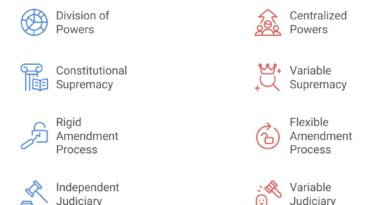COMPETES Act
Context:
The United States has unveiled the ambitious America Creating Opportunities for Manufacturing, Pre-Eminence in Technology, and Economic Strength (COMPETES Act), 2022, which proposes to open up new vistas for talented individuals from across the world with a new start-up visa.
Contents
What is the COMPETES Act?
- The bill provides $52 billion to encourage more semiconductor production in the US, and $45 billion for grants and loans to improve supply chain resilience and manufacturing, among other programs.
- It also includes funding to address social and economic inequality, climate change, and immigration.
- For instance, it provides an exemption for STEM PhDs from the green card cap and creates a new green card for entrepreneurs.
- The bill also authorizes $600 million a year to construct manufacturing facilities to make the US less reliant on solar components made in Xinjiang, China.
Key provisions in the COMPETES Act
- The Act amends the Immigration and Nationality Act to create a new classification of “W” non-immigrants for entrepreneurs with an ownership interest in a start-up entity.
- It seeks to establish procedures for foreign nationals with an ownership interest in a start-up entity to self-petition for lawful permanent resident status as an immigrant entrepreneur.
- The bill exempts from the numerical limits on immigrant visas certain foreign nationals (and the spouses and children of such aliens) who have earned a doctoral degree in STEM.
Significance:
- It would mean more opportunities in the US for Indian talent and skilled workers.
- Every year, Indians and Indian companies corner the lion’s share of H-1B work permits issued that year. With this new category, Indian professionals will likely have a better shot at opportunities that the Act is likely to provide.
Background
The US Government provides specific number of VISAs every year to fill in the job vacancies. This is done to allow the low – cost highly skilled IT professionals to fill in the vacancies. Through these VISAs the companies in foreign soil send their employees to the US. The companies gain knowledge as asset and US gains cheap workers. The following VISAs are offered:
- H1-B visa: They are issued for people in Specialty operations. The people should have higher educational qualification to obtain this visa. It is popular among Indians
- H2-B Visa: They are for seasonal workers in hospitality industries
- L-1 Visa: The VISA allows the American companies to transfer workers to American soil for a period of seven years
- H-4 Visa: It is used by the dependents of H-1B Visa holders
- J-1 Visa: It is used by students entering American soil for study purposes
Implications for Indians
- It would mean more opportunities in the US for Indian talent, and for skilled workers.
- Every year, the US administration issues 85,000 H-1B work permits.
- Every year, Indians and Indian companies corner a lion’s share of the H-1B work permits issued that year.
- With this new category, Indian professionals will likely have a better shot at opportunities that the Act is likely to provide.
Significance of Indian Diaspora in the US
- Indian-Americans are the second-largest immigrant community in the US(4 million-plus).
- They are considered as one of the most influential groups in the US. and they have played a key role in transforming the relations. For example, the U.S. signing the civil nuclear deal.
- In addition, many American Indians have entered into the administration and the US congress.
- Yet, over the past years, there has been a divergence in the preference of the community especially the second generation of American Indians. They have become more Americanised.
How the attitude changes of Indian-Americans is affecting India-US relations?
- The second generation of American Indians has their own assessment of developments in India. For example, Government steps on Farmers protest in India was criticized by many American- Indian citizens.
- The India caucus (A caucus is a meeting of supporters or members of a specific political party) with the Indian Ambassador to the United States offers an insight into the changing attitude of the Indian-American community.
- For example, the caucus with representatives from the Indian-American community urged the Government of India to make sure that the norms of democracy are maintained.
- Also, they stated that protesters shall be allowed to protest peacefully with access to the Internet and journalists.
- Third, notably, the External Affairs Minister S. Jaishankar cancelled the engagement with the top leadership of the US House Foreign Affairs Committee congress in December 2019.
- This was due to the presence of Ms. Jayapal (Democrat, Indian-American) who voiced against the Indian government clampdown in Kashmir.
- In addition to the above issues, Countering America’s Adversaries Through Sanctions Act (CAATSA) might impact India-USA ties. Because India has proceeded to procure the Russian S-400 missile defence system which is against the CAATSA act.
Source: Indian Express
You can find many articles on INTERNATIONAL RELATION (part of GS II) in our website. Go through these articles share with your friends and post your views in comment section.
Discover more from Simplified UPSC
Subscribe to get the latest posts sent to your email.


